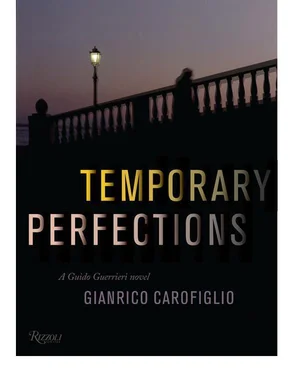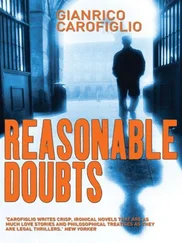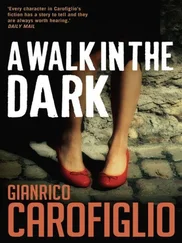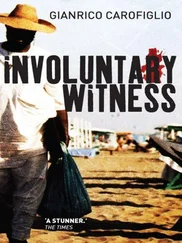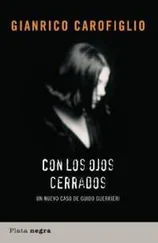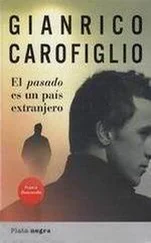Gianrico Carofiglio - Temporary Perfections
Здесь есть возможность читать онлайн «Gianrico Carofiglio - Temporary Perfections» весь текст электронной книги совершенно бесплатно (целиком полную версию без сокращений). В некоторых случаях можно слушать аудио, скачать через торрент в формате fb2 и присутствует краткое содержание. Жанр: Криминальный детектив, на английском языке. Описание произведения, (предисловие) а так же отзывы посетителей доступны на портале библиотеки ЛибКат.
- Название:Temporary Perfections
- Автор:
- Жанр:
- Год:неизвестен
- ISBN:нет данных
- Рейтинг книги:3 / 5. Голосов: 1
-
Избранное:Добавить в избранное
- Отзывы:
-
Ваша оценка:
- 60
- 1
- 2
- 3
- 4
- 5
Temporary Perfections: краткое содержание, описание и аннотация
Предлагаем к чтению аннотацию, описание, краткое содержание или предисловие (зависит от того, что написал сам автор книги «Temporary Perfections»). Если вы не нашли необходимую информацию о книге — напишите в комментариях, мы постараемся отыскать её.
Temporary Perfections — читать онлайн бесплатно полную книгу (весь текст) целиком
Ниже представлен текст книги, разбитый по страницам. Система сохранения места последней прочитанной страницы, позволяет с удобством читать онлайн бесплатно книгу «Temporary Perfections», без необходимости каждый раз заново искать на чём Вы остановились. Поставьте закладку, и сможете в любой момент перейти на страницу, на которой закончили чтение.
Интервал:
Закладка:
Gianrico Carofiglio
Temporary Perfections
1.
It all began with an innocent phone call from an old college classmate.
Sabino Fornelli is a civil lawyer. If one of his clients runs into criminal problems, Sabino calls and gives me the case. Then he washes his hands of it. Like many civil lawyers, he thinks of the criminal court system as a dangerous and disreputable place. He tries to steer clear of it.
One March afternoon, while I was absorbed in an appeal I was scheduled to argue the following day before the Court of Cassation, I received a call from Sabino Fornelli. We hadn’t spoken in months.
“Ciao, Guerrieri, how are you?”
“Fine, how about you?”
“Same as ever. My son’s doing a semester abroad, in the U.S.”
“Great. Wonderful idea, that’ll be a memorable experience.”
“It’s been a memorable experience for me, certainly. My wife’s been driving me crazy since the day he left. She’s been worried sick about him.”
We went back and forth for a few more minutes, exchanging the usual platitudes, and then he got to the point of his call: Two clients of his wanted to see me about a sensitive and urgent matter. He spoke the words “sensitive and urgent” in a hushed voice that struck me as slightly ridiculous. The most serious case Fornelli had referred to me so far was a dramatic little affair involving obscenities and insults, a beating, and a breaking-and-entering charge.
Basically, given our past history, I couldn’t take it too seriously when Sabino Fornelli called any case he sent my way “sensitive and urgent.”
“I’m going to Rome tomorrow, Sabino, and I don’t know what time I’ll be back. The next day is Saturday.” I glanced quickly at my appointment book. “Ask them to stop by late on Monday, some time after eight. What’s the case?”
He didn’t speak for a moment.
“Fine, some time after eight. I’m going to come, too. We’ll tell you all about it in person. That’ll be easier.”
Now it was my turn not to speak for a moment. Fornelli had never come to my office with any of his referrals. I was about to ask him why he was doing it this time, and why he couldn’t tell me anything over the phone, but something stopped me. Instead, I just said that it was fine and I’d expect them in my office at 8:30 on Monday. Then we both hung up.
I sat there for a minute, wondering what this was about. I couldn’t think of an explanation, so I went back to my appeal.
2.
I like appearing before the Court of Cassation in Rome. It’s Italy’s highest court, and the judges are almost always well informed. They rarely fall asleep during hearings, and the chief magistrates, with the occasional exception, are courteous, even when they’re ordering you to keep it short and not to waste the court’s time.
The Court of Cassation is different from the criminal courts and especially the appellate courts. When you appear before the Court of Cassation, you feel you’re in an orderly world, part of a justice system that works. That’s just a feeling, of course, because the world is not orderly and justice is not served. Still, it’s a nice feeling to have, and I’m usually in a good mood when I have to argue a case before the Court of Cassation, even though it means I have to get up earlier than usual.
It was a beautiful day, chilly and bright. The airplane took off and landed on time, defying the prevailing pessimistic expectations about air travel.
During the taxi ride from the airport to the courthouse, I had an unusual experience. The cab was just pulling away from the terminal when I noticed a dozen or so paperbacks piled on the passenger seat. I’m always curious to see which books people have in their homes, so I was even more curious about these books, found unexpectedly in the front seat of a cab. I glanced at the covers. There were a couple of mass-market detective novels, but also Simenon’s Red Lights, Fenoglio’s A Private Affair, and even a book of poetry by Garcia Lorca.
“What are you doing with those books?”
“I read them, between fares.”
Fair enough-a stupid question deserves a short answer. What does anyone do with books but read them?
“I asked because it’s a little… unusual to see books in a taxi, especially so many of them.”
“That’s not true, actually. Lots of cab drivers like to read.”
He spoke an almost unaccented Italian, and he seemed to choose his words deliberately. He handled his words with caution, as if they were delicate-even slightly dangerous-objects. As if they were razor sharp.
“I’m sure you’re right. But you have a whole library up there.”
“That’s because I like to read several books at once. I switch depending on my mood. So I bring a lot of books with me, and then I forget to take home the ones I finish, and before you know it I’ve got a whole pile of them.”
“I like to read several books at once, too. What are you reading now?”
“A Simenon novel. One reason I like it is that part of it takes place in a car, and I spend all my time in a car. That helps me appreciate it. Also, some Garcia Lorca poems. I really like poetry, but it’s pretty challenging. And when I’m tired, I read that one.” He pointed at one of the mass-market mysteries. He named neither the title nor the author of the last book, and rightly so, I thought. I felt as if there were a complete aesthetic-precise, incisive, and well-defined-in the way he had discussed, and tacitly classified, his current reading list. I liked that. I tried to get a look at his face, from the elusive glances I caught of his profile as he drove and from his reflection in the rearview mirror. He was about thirty-five and pale, with a hint of shyness to his eyes.
“How did you become such an avid reader?”
“You won’t believe me if I tell you.”
“Try me.”
“Until I was twenty-eight, I’d never picked up a book in my life outside of school. And I had a speech defect: I stuttered. I had a very bad stutter. You know, a stutter can ruin your life.”
I nodded. Then I realized he couldn’t see me.
“Yes, I can imagine. But you speak perfectly,” I said. As I said it, though, I thought of his cautious way of speaking, the way he handled the words with care.
“After a while, I couldn’t take it anymore. I went to see a speech therapist, and I took a course to get rid of my stutter. During the course we read books aloud.”
“And that’s how you got started?”
“Yes, that’s how I discovered books. I finished the course, but I kept on reading. People say everything happens for a reason. Maybe I stuttered because I was meant to discover books. I don’t know. But now my life is completely different from the way it used to be. I can’t even remember how I used to spend my days.”
“Well, that’s a great story. I wish something like that would happen to me.”
“What do you mean? Don’t you like to read?”
“No, no, I love it. It’s probably my favorite thing. What I meant was I wish my life would change in some fantastic way like yours did.”
“Oh, I see,” he said. We were quiet as the car sped along the bus-and-taxi lane of the Via Ostiense.
We made it all the way to Piazza Cavour without hitting traffic once. My friend the book-reading cabbie stopped the car, turned off the ignition, and turned around to look at me. I thought he was about to tell me how much I owed him. I reached for my wallet.
“I’m reminded of a Paul Valery quote.”
“Yes?”
“It goes something like, ‘The best way to make your dreams come true is to wake up.’ ”
We sat there for a few seconds, looking at one another. There was something more complex than shyness in the man’s eyes. It was as if he were accustomed to fear, and he had disciplined himself to control that fear, in the knowledge that it would always be with him, waiting. I think my eyes displayed astonishment. I tried to remember if I’d ever read anything by Valery. I wasn’t sure.
Читать дальшеИнтервал:
Закладка:
Похожие книги на «Temporary Perfections»
Представляем Вашему вниманию похожие книги на «Temporary Perfections» списком для выбора. Мы отобрали схожую по названию и смыслу литературу в надежде предоставить читателям больше вариантов отыскать новые, интересные, ещё непрочитанные произведения.
Обсуждение, отзывы о книге «Temporary Perfections» и просто собственные мнения читателей. Оставьте ваши комментарии, напишите, что Вы думаете о произведении, его смысле или главных героях. Укажите что конкретно понравилось, а что нет, и почему Вы так считаете.
